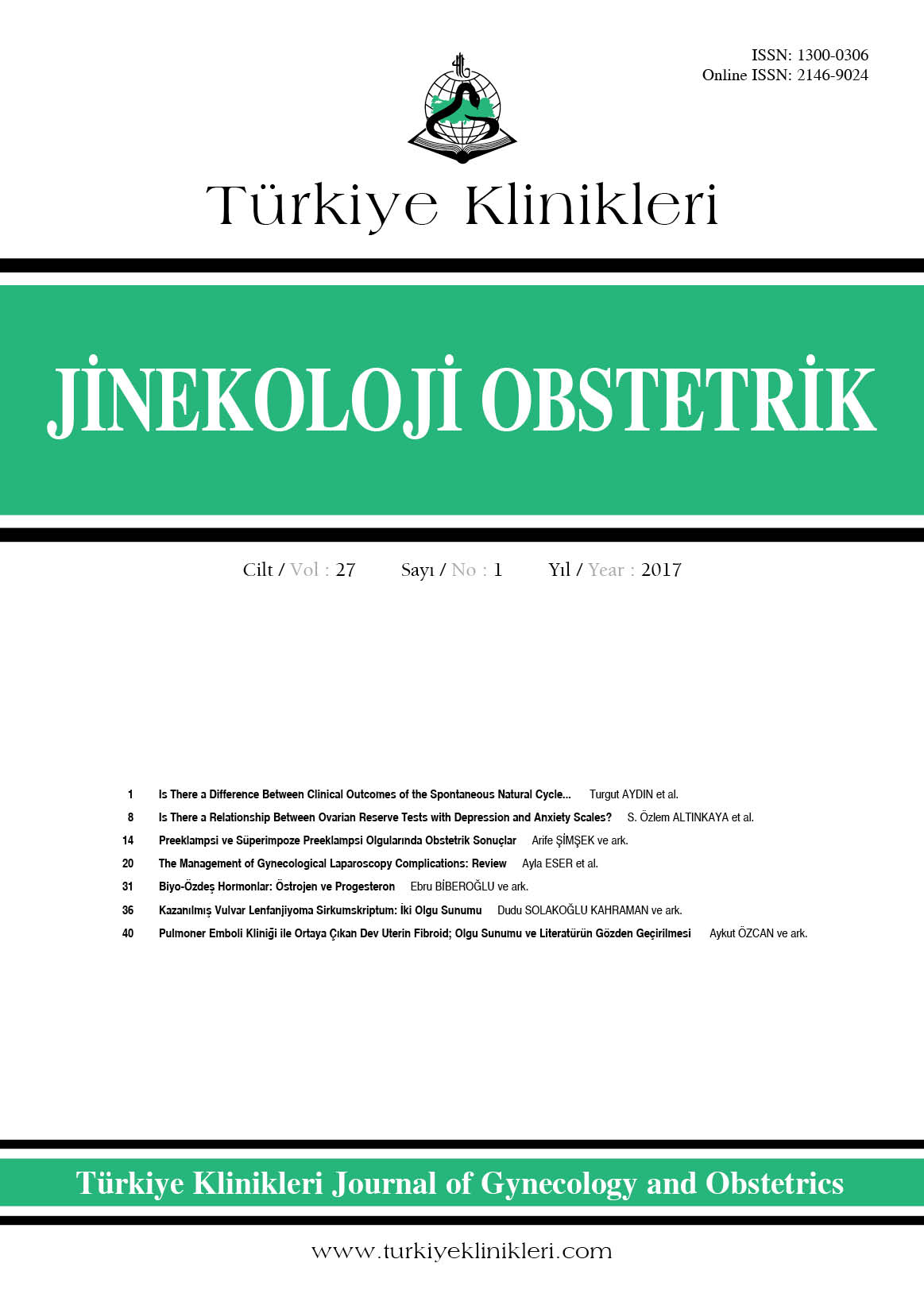Open Access
Peer Reviewed
ORIGINAL RESEARCH
2418 Viewed1309 Downloaded
Is There a Relationship Between Ovarian Reserve Tests with Depression and Anxiety Scales?
Over Rezerv Testleri ile Depresyon ve Anksiyete Ölçekleri Arasında İlişki Var mı?
Turkiye Klinikleri J Gynecol Obst. 2017;27(1):8-13
DOI: 10.5336/gynobstet.2016-53693
Article Language: EN
Article Language: EN
Copyright Ⓒ 2025 by Türkiye Klinikleri. This is an open access article under the CC BY-NC-ND license (http://creativecommons.org/licenses/by-nc-nd/4.0/)
ABSTRACT
Objective: An important point at issue has been shown by the possible causal connection between psychopathology and infertility. The aim of the present study was to investigate whether there was an association between ovarian reserve tests and depression and anxiety scales. Material and Methods: A total of 50 women, who attended the infertility clinic of Adnan Menderes University Hospital, with primary infertility, were eligible for the study. Anti-mullerian hormone (AMH), follicle stimulating hormone, luteinizing hormone and estradiol levels were assessed for establishing ovarian reserve. All participants fulfilled standardized questionnaires evaluating depression Beck Depression Inventory (BDI) and anxiety Beck Anxiety Inventory (BAI). Multiple Linear Regression analyses were used to determine the best independent predictor(s) which affected on both BDI and BAI levels. Results: Both depression and anxiety scores were positively correlated with age, body mass index (BMI), duration of infertility, and diminished ovarian reserve (p<0.05). Regression analyses showed that lower AMH levels (p<0.001), higher BMI (p<0.05) and longer duration of infertility (p<0.05) were the predictors of both higher depression and anxiety scores. Conclusion: The data of the present study have established that higher depression and anxiety scores were associated with poor ovarian reserve as well as higher BMI and longer duration of infertility, suggesting that psychological support is needed for this group of women.
Objective: An important point at issue has been shown by the possible causal connection between psychopathology and infertility. The aim of the present study was to investigate whether there was an association between ovarian reserve tests and depression and anxiety scales. Material and Methods: A total of 50 women, who attended the infertility clinic of Adnan Menderes University Hospital, with primary infertility, were eligible for the study. Anti-mullerian hormone (AMH), follicle stimulating hormone, luteinizing hormone and estradiol levels were assessed for establishing ovarian reserve. All participants fulfilled standardized questionnaires evaluating depression Beck Depression Inventory (BDI) and anxiety Beck Anxiety Inventory (BAI). Multiple Linear Regression analyses were used to determine the best independent predictor(s) which affected on both BDI and BAI levels. Results: Both depression and anxiety scores were positively correlated with age, body mass index (BMI), duration of infertility, and diminished ovarian reserve (p<0.05). Regression analyses showed that lower AMH levels (p<0.001), higher BMI (p<0.05) and longer duration of infertility (p<0.05) were the predictors of both higher depression and anxiety scores. Conclusion: The data of the present study have established that higher depression and anxiety scores were associated with poor ovarian reserve as well as higher BMI and longer duration of infertility, suggesting that psychological support is needed for this group of women.
ÖZET
Amaç: İnfertilite ile psikopatoloji arasında önemli bağlantı olduğu düşünülmektedir. Bu çalışmanın amacı infertil hastalarda depresyon ve anksiyeteyi ölçekler vasıtasıyla değerlendirip bu ölçeklerin over rezerv testleriyle ilişkisini araştırmaktır. Gereç ve Yöntemler: Çalışmaya infertilite şikayeti ile başvuran 50 primer infertil hasta dahil edildi. Over rezervinin değerlendirilmesi amacıyla anti-müllerian hormon (AMH), siklusun 2-3-4'üncü günlerinde folikül stimülan hormon (FSH), lüteinizan hormon (LH), östradiol (E2) düzeyleri çalışıldı. Beck depresyon (BDI) ve Beck anksiyete (BAI) ölçekleri anket yöntemiyle doldurtuldu. Çoklu lineer regresyon analizleri ile bu ölçeklere etki eden en iyi bağımsız prediktörler tespit edildi. Bulgular: Hem depresyon hem de anksiyete skorları yaş, beden kitle indeksi (BKİ), infertilite süresi ve azalmış over rezervi ile pozitif korelasyon gösterdi (p<0,05). Regresyon analizi sonuçlarına göre düşük AMH düzeyleri (p<0,001), yüksek BKİ (p<0,05) ve infertilite süresinin uzunluğu (p<0,05) yüksek anksiyete ve depresyon skorları için en iyi prediktörler olarak belirlendi. Sonuç: Bu çalışmanın sonuçlarına göre yüksek anksiyete ve depresyon skorları düşük over rezervi, yüksek BKİ ve infertilite süresinin uzunluğu ile ilişkilidir. Klinisyenler, infertil hastaların anksiyete ve duygu durum bozuklukları için yüksek risk grubunda oldukları konusunda bilinçli olmalıdır ve bu grup hastalara gerekli psikolojik destek sağlanmalıdır.
Amaç: İnfertilite ile psikopatoloji arasında önemli bağlantı olduğu düşünülmektedir. Bu çalışmanın amacı infertil hastalarda depresyon ve anksiyeteyi ölçekler vasıtasıyla değerlendirip bu ölçeklerin over rezerv testleriyle ilişkisini araştırmaktır. Gereç ve Yöntemler: Çalışmaya infertilite şikayeti ile başvuran 50 primer infertil hasta dahil edildi. Over rezervinin değerlendirilmesi amacıyla anti-müllerian hormon (AMH), siklusun 2-3-4'üncü günlerinde folikül stimülan hormon (FSH), lüteinizan hormon (LH), östradiol (E2) düzeyleri çalışıldı. Beck depresyon (BDI) ve Beck anksiyete (BAI) ölçekleri anket yöntemiyle doldurtuldu. Çoklu lineer regresyon analizleri ile bu ölçeklere etki eden en iyi bağımsız prediktörler tespit edildi. Bulgular: Hem depresyon hem de anksiyete skorları yaş, beden kitle indeksi (BKİ), infertilite süresi ve azalmış over rezervi ile pozitif korelasyon gösterdi (p<0,05). Regresyon analizi sonuçlarına göre düşük AMH düzeyleri (p<0,001), yüksek BKİ (p<0,05) ve infertilite süresinin uzunluğu (p<0,05) yüksek anksiyete ve depresyon skorları için en iyi prediktörler olarak belirlendi. Sonuç: Bu çalışmanın sonuçlarına göre yüksek anksiyete ve depresyon skorları düşük over rezervi, yüksek BKİ ve infertilite süresinin uzunluğu ile ilişkilidir. Klinisyenler, infertil hastaların anksiyete ve duygu durum bozuklukları için yüksek risk grubunda oldukları konusunda bilinçli olmalıdır ve bu grup hastalara gerekli psikolojik destek sağlanmalıdır.
MENU
POPULAR ARTICLES
MOST DOWNLOADED ARTICLES





This journal is licensed under a Creative Commons Attribution-NonCommercial-NoDerivatives 4.0 International License.










